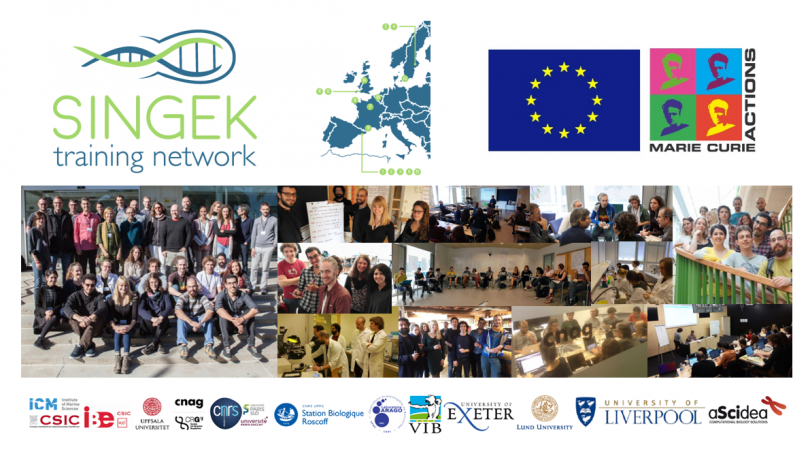This Innovative Training Network, which has been coordinated by the ICM, aimed to explore the potential of single cell genomics approaches to study novel aspects of the ecology and evolution of microbial eukaryotes.

Marine microbes are very diverse and uncharacterized. Fundamental answers on their evolutionary patterns and ecological performance can be decoded from its gene content, but genomics was hindered by the difficulty to grow most species in the lab. Single Cell Genomics is a novel approach to get these novel genomes and represents a unique opportunity to learn from the "uncultured microbial majority".
Considering the multiple faces of Single Cell Genomics, the ICM researcher Ramon Massana built SINGEK, a Marie-Skłodowska-Curie Innovative Training Network to explore this new field, which was awarded with 3.9 million Euros under the H2020 Framework Program. The final goal of this network was to train a new generation of researchers under the motto: “training through research".
"Coordinating the SINGEK network was arduous at some times, but we successfully implemented the project’s proposal as originally envisaged. After more than 4 intense years, I feel very happy that I managed to assure the overall project progress and success", celebrates Massana.
Elena Torrecilla, the SINGEK project manager that coordinated fifteen research teams from four universities, seven research organisations and one company, states that “participating in SINGEK has been more than an enriching opportunity. Our goal was to keep Early Stage Researchers (ESRs) at the centre and find the right balance between creating a stimulating research environment and providing the right tools to facilitate their career development, and we did it”.
According to Torrecilla, “the key to success has been the regular contact established through project meetings, research visits, outreach activities and training courses. These activities were key to create a successful collaborative network and also to see the improvements of the ESRs as science communicators in different formats and in front of different audiences”.
Overall, the main milestones of SINGEK were accomplished, leading to multiple achievements. In this regard, a total of 5 ESRs have already obtained their PhD degree and 8 ESRs are going to do it in the next following months. Besides, more than 25 peer-reviewed articles co-authored by ESRs have already been published and 25 more will come soon. This list of publications includes a special issue entitled “Single Cell Ecology”, resulting from the international congress organized by the SINGEK consortium and published in the prestigious journal Philosophical Transactions of the Royal Society B.
Moreover, several training workshops on scientific and transferable skills essential for successful career development were organized within the project’s framework, including sessions on collaborative learning, core communication skills and time management, single cell sorting and analysis, genome assembly and annotation, advanced scientific writing, and career development.
“This training program was a great opportunity to work in a multidisciplinary environment with open up perspectives. It definitely provided a challenging and rewarding educational experience”, explains Aurelie Labarre, one of the ESRs supervised by Ramon Massana, who assures that “the eclectic nature of this experience helped me to develop my own research project with a large degree of autonomy”.
Overall, the SINGEK project covered a number of aspects which will for sure have a long-term impact on the careers of ESRs like Aurelie. "Now I look back and see what SINGEK has left behind. A whole generation of new scientists well trained to fully exploit Single Cell Genomics potential”, highlights Massana, who reminds that SINGEK activities have contributed to advance in genomic data of the uncultured majority.
“Innovative results have been published to study new functional insights of uncultured microbial eukaryotes, to study their biogeography and activity on global environmental surveys, to study parasites or pathogens of relevant host populations, to study genomic evolution, and to add new species to refine the eukaryotic tree of life”, concludes the SINGEK’s coordinator.